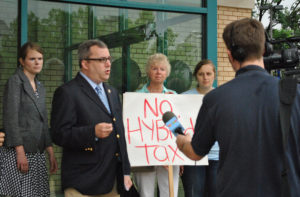
Arlington’s lengthy, detailed public space planning documents might seem dry and technical at first glance, but an impending update to those plans has sparked a bitter fight in the county.
Though the sparring centers largely around reams of statistics and data, the debate cuts to the heart of a key question for leaders in the 26-square-mile county: how should Arlington divvy up its limited amount of public land?
The newly revised “Public Spaces Master Plan” is designed to provide lots of answers to that question for Arlington officials. Last updated in 2005, the document sketches out the county’s goals for building and maintaining its parks, fields, trails and other open spaces.
Since 2015, community leaders have been working to update the document in a process commonly known as “POPS,” or “A Plan for Our Places and Spaces.” A county advisory committee has been sharpening the document’s specifics for months, and the County Board now looks ready to schedule public hearings and a vote on the plan’s update this weekend.
But critics charge that the plan is fatally flawed, and some have spent more than a year working to build opposition to one of its key elements. Chiefly, they’re concerned that the new document calls for the county to set aside more space for athletic fields than it actually needs, which could gobble up room for other important facilities (namely, schools and parks).
Opponents of the plan also argue that county staff have been deceptive in providing data to guide this process, undermining many of the master plan’s conclusions.
Others close to the process, especially those representing parks or sports groups, feel those concerns are misguided, and insist that the new plan will provide an adequate roadmap for meeting the growing demand for field space in Arlington. But, with the issue coming to a head in the coming weeks, the plan’s critics are hopeful that the Board will take their concerns seriously and act accordingly.
“The county is going to use this document to make decisions for the next 20 years,” said Peter Rousselot, a leader with the “Parks for Everyone” advocacy group and a regular ARLnow columnist. “But through it all, we’ve had the sense that [county staff] weren’t an honest broker on this. And that matters, when this stuff might someday be taken as gospel, and staff might point to it and say ‘the County Board voted 5-0 to approve this.'”
Both critics and supporters of the plan acknowledge that the latest draft of the document has gone through sufficient changes since it was released last fall to be a lot more appealing to all involved. Yet emotions around the issue are, undoubtedly, still running high.
“There have been lots of accusations against county staff, and we’ve met with [the plan’s critics] several times,” said Caroline Haynes, a co-chair of the POPS advisory group and the chair of the county’s Parks and Recreation Commission. “But some people we’re just never going to please. We’re just not.”
How many more fields does Arlington need?
Rousselot, who has long been active in county politics, says he became interested in the issue as other local activists began to bring it to his attention. Kari Klaus was a key driver of those early efforts, based on her previous work examining the county’s plans for parks in Aurora Highlands, and the pair worked with some other concerned community members to found Parks for Everyone.
Chiefly, Klaus and Rousselot became concerned about the plan because of one, highly technical, piece of data contained within the document: something called “population-based level of service” analysis.
In essence, the calculation involves county staff looking at Arlington’s population data, national averages and other “peer localities” to see how many parks and fields Arlington needs to serve its residents. In this case, staff judged Arlington’s peers to be other suburbs of major cities including: Alexandria; Bellevue, Washington; Berkeley, California; and St. Paul, Minnesota.
Using that data, staff came up with ratios designed to guide how many facilities the county needs to add going forward.
For instance, Arlington currently has 53 rectangular, athletic fields — the plan’s estimates suggest the county should be striving to have closer to 61 instead. Similarly, the document shows that Arlington has 43 “diamond” baseball fields, while 54 might be a better number to serve its current population. And both of those projections will only grow as the county swells with new residents over time.
Those estimates disturbed and frustrated Rousselot and Klaus. They say they couldn’t understand how the county landed on those figures, instead of relying on current data showing how often people use the county’s existing fields.
Several people interested in the matter filed a series of public records requests to get more county data, and became increasingly frustrated that staff would only release limited information about their process for calculating those numbers.
But, from what they did find, Rousselot and his fellow critics became convinced that the county’s Department of Parks and Recreation wasn’t following the industry’s best practices for coming up with “level of service” calculations. They argue that the number of people actively seeking to use county fields would provide a much better baseline to work off of than simply the number of people living in the county in total.
“DPR had lots of data on supply and demand, but staff didn’t use it to inform themselves about what this population-based LOS number ought to be,” Rousselot said. “And it was so hard to even get them to acknowledge they had this data.”
In response to the group’s extensive criticisms, County Manager Mark Schwartz released a lengthy statement defending staff’s methods. Chiefly, he argued that “population is an easily understood way to project needs and is used regularly by the county and [the school system] to anticipate future capacity.”
Haynes echoed that point, stressing that all of the advisory committee’s work suggested that the population-based calculations were the “most straightforward method” possible for staff to use. Otherwise, she says the county would have to rely on a cascading series of assumptions about how much field use would increase (or decrease) over time, which might prove increasingly inaccurate as time goes by.
Rousselot, however, argues that such a standard for calculating field needs is “deceptively simple,” and doesn’t allow much room for nuance as decisions get made in the future.
“There is something quite appealing at first blush about how simple it is,” Rousselot said. “But the way history tells us DPR operates is that these numbers become much more gospel like than they deserve.”
Is demand real, or deceptive?
But Haynes vigorously defended county staff’s management of the process, and their willingness to re-examine their own methods. She said the advisory committee has broadly been “very pleased” with the county throughout the process, which she finds slightly “incredible” given that they’ve been working together for the better part of four years now.
And she believes that the open space plan’s critics miss an obvious point about the county’s current conditions — field space is already at a premium for sports teams and casual users alike.
“Arlington is growing and we need more of everything,” Haynes said. “Sometimes we have four to six teams playing on any given field.”
But Rousselot and the plan’s critics charge that field demand can be deceptive — he sees the county’s management of its fields as the root cause of any problems. Many field reservations are managed by volunteers, not county staff, which he feels has led to plenty of inefficiencies. Other fields are unusable because they haven’t been maintained well, which Rousselot chalks up to the county’s shrinking maintenance budget.
“It’s left a lot of sports teams angry and under the impression that they can’t get fields,” Rousselot said. “But the process of scheduling and maintenance has been, to put it diplomatically, a mess.”
Haynes argues it would not be “an efficient use of county resources” to task staff with managing fields, and says the county has done some work with its Sports Commission to encourage better communication with sports leagues to determine who needs certain fields and when.
And Schwartz pointed out in his statement that the county is currently reviewing its processes on both those fronts.
“We do not have it figured out yet — but we are doing better maintenance, better scheduling, and creating more opportunities for the fields to be available for casual use when not scheduled,” Schwartz wrote.
What happens next?
Fundamentally, Haynes believes that the county has been responsive to all of the concerns Rousselot and others have raised.
And she doesn’t want the concerns of a few critics derail the passage of a plan that’s been years in the making, particularly when many others support it. A petition backed by the Arlington Sports Foundation supporting the plan now has nearly 1,300 signatories.
“What we’ve heard is a very small group of people who have been very vocal about it,” Haynes said. “There is so much good stuff in here, but we’ve really gotten sidetracked on just a few issues.”
But Rousselot and his allies believe they’ve convinced enough people around the county of their point of view that they are more than just lone voices in the wilderness.
Most notably, the Arlington Civic Federation, one of the county’s oldest and most revered civic organizations, threw its support behind their efforts. Rousselot and other critics presented their case at one of the group’s meetings, and after some follow-up study of the plan, the federation’s members voted 66-17-3 to issue a resolution broadly echoing Rousselot’s critiques of the plan.
Specifically, the group urged the county to strip those level of service recommendations from the plan, arguing that “available data appears to demonstrate that the LOS for athletic fields has been significantly overstated.”
“The fact that they have come out so overwhelmingly in favor of this makes it pretty hard for people trying to argue that it’s four or five malcontents raising these issues,” Rousselot said.
Rousselot credited the group’s intervention for spurring some changes to the plan, and even Haynes would agree that staff and her committee has been able to make some tweaks to the document in recent weeks.
Specifically, she said they’ve sought to stress that “this is a high level planning document, it’s not proscriptive,” particularly when it comes to how closely the county should follow its recommendations about how many fields it needs to build. As Rousselot puts it, the revised plan “softens the Moses tablet-like” quality of those recommendations, making it a bit less likely that officials hew quite so closely to those numbers in the future.
Still, the document’s critics would rather see the population-based level of service recommendations removed entirely before the plan is passed, but that looks increasingly unlikely.
Then-County Board Chair Katie Cristol wrote an October letter to Klaus and Rousselot saying that four of the Board’s five members supported leaving that section of the plan in place. She said Board members felt the metric was “the more appropriate one for our community, where different stakeholders have widely divergent assumptions about future [field] utilization.”
The lone Board member to support revisions to that part of the plan was John Vihstadt, Cristol wrote, but the independent lost his seat to Democrat Matt de Ferranti last fall.
Accordingly, it would seem the current plan has enough support to pass in its current form sometime this spring. The Planning Commission voted last night (Wednesday) to recommend that the County Board advertise public hearings on the plan at its meeting Saturday — that would set the stage for a final vote on the plan in April.
With the process nearing its conclusion, Rousselot is encouraged that Parks for Everyone achieved some of its goals. But he’s still holding out hope that leaders will just go a few steps further in tweaking the plan’s prescriptions.
“Assuming the Board adopts at least some of the changes we recommended, then we’ll be better off than we would’ve been if we hadn’t raised the issue,” Rousselot said. “How much better off will depend on what happens next.”
Photo via Arlington County



 Peter’s Take is a weekly opinion column. The views and opinions expressed in this column are those of the author and do not necessarily reflect the views of
Peter’s Take is a weekly opinion column. The views and opinions expressed in this column are those of the author and do not necessarily reflect the views of 









